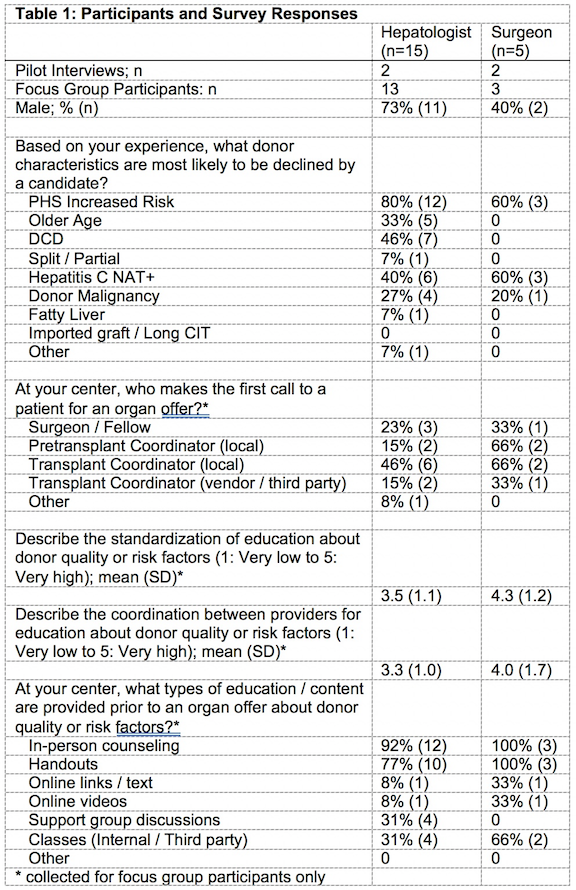Hepatologist and Surgeon Experiences Counseling Liver Transplant Candidates for an Organ Offer Decision
1Hennepin Heathcare Research Institute (HHRI), Minneapolis, MN, 2College of Design, University of Minnesota (UMN), Minneapolis, MN, 3College of Design, UMN, Minneapolis, MN, 4Department of Surgery, UMN, Minneapolis, MN, 5Division of Gastroenterology, Hepatology, and Nutrition, UMN, Minneapolis, MN, 6Department of Medicine, Hennepin Healthcare, UMN, Minneapolis, MN
Meeting: 2020 American Transplant Congress
Abstract number: D-109
Keywords: Donors, marginal, Liver transplantation, Patient education
Session Information
Session Name: Poster Session D: Liver: MELD, Allocation and Donor Issues (DCD/ECD)
Session Type: Poster Session
Date: Saturday, May 30, 2020
Session Time: 3:15pm-4:00pm
 Presentation Time: 3:30pm-4:00pm
Presentation Time: 3:30pm-4:00pm
Location: Virtual
*Purpose: Liver transplant candidates receive counseling during evaluations to understand donor risk factors. After long periods on the waitlist, candidates who receive an offer for a marginal donor may be risk averse. Providing decision support throughout the waiting process, as candidate conditions and priorities change, may help prepare patients and family for urgent decisions. Understanding hepatologist and surgeon experience in current practice will inform development of new decision support tools.
*Methods: Pilot interviews and focus groups with liver transplant providers included discussions about current practice counseling patients and recommendations for improving decision support for offer decisions. Survey data collected experiences at each provider’s program. Pilot interviews were conducted at a single midwestern United States center. Focus groups included US and international hepatologists and surgeons attending a national conference. Participants were purposively recruited to include at least one participant from each Organ Procurement and Transplant Network (OPTN) region. Qualitative feedback and descriptive statistics were summarized to inform development of patient tools.
*Results: 4 providers participated in local pilot interviews and 16 participated in meetings at a national conference. Qualitative feedback included recommendations to supplement existing education efforts and to extend counseling beyond the evaluation period, due to poor retention during this time. Tailoring to patient characteristics may increase the benefit for candidates not appropriate for some organ types (e.g. DCD) or with differing disease progression (e.g. HCC) and may address cultural differences resulting in risk aversion. Survey responses reflected a variation in center practices, including organ types most commonly declined, degree of coordination of counseling, and types of patient education [Table 1].
*Conclusions: New decision support tools for offer decisions may address gaps in patient counseling, in particular after evaluations, to potentially reduce variability of decision support and increase organ utilization.
To cite this abstract in AMA style:
Schaffhausen C, Bruin M, Chu S, Chinnakotla S, Lake JR, Israni AK. Hepatologist and Surgeon Experiences Counseling Liver Transplant Candidates for an Organ Offer Decision [abstract]. Am J Transplant. 2020; 20 (suppl 3). https://atcmeetingabstracts.com/abstract/hepatologist-and-surgeon-experiences-counseling-liver-transplant-candidates-for-an-organ-offer-decision/. Accessed February 26, 2026.« Back to 2020 American Transplant Congress

